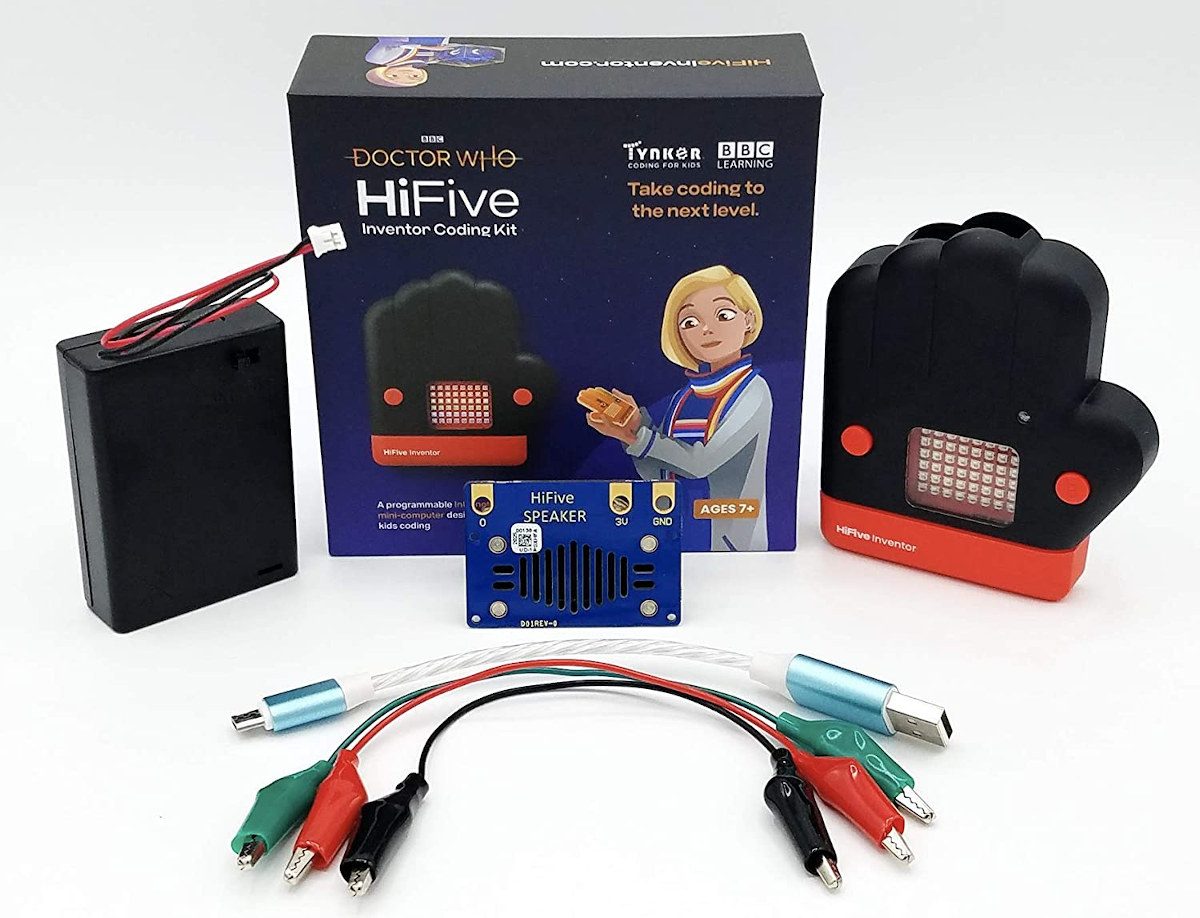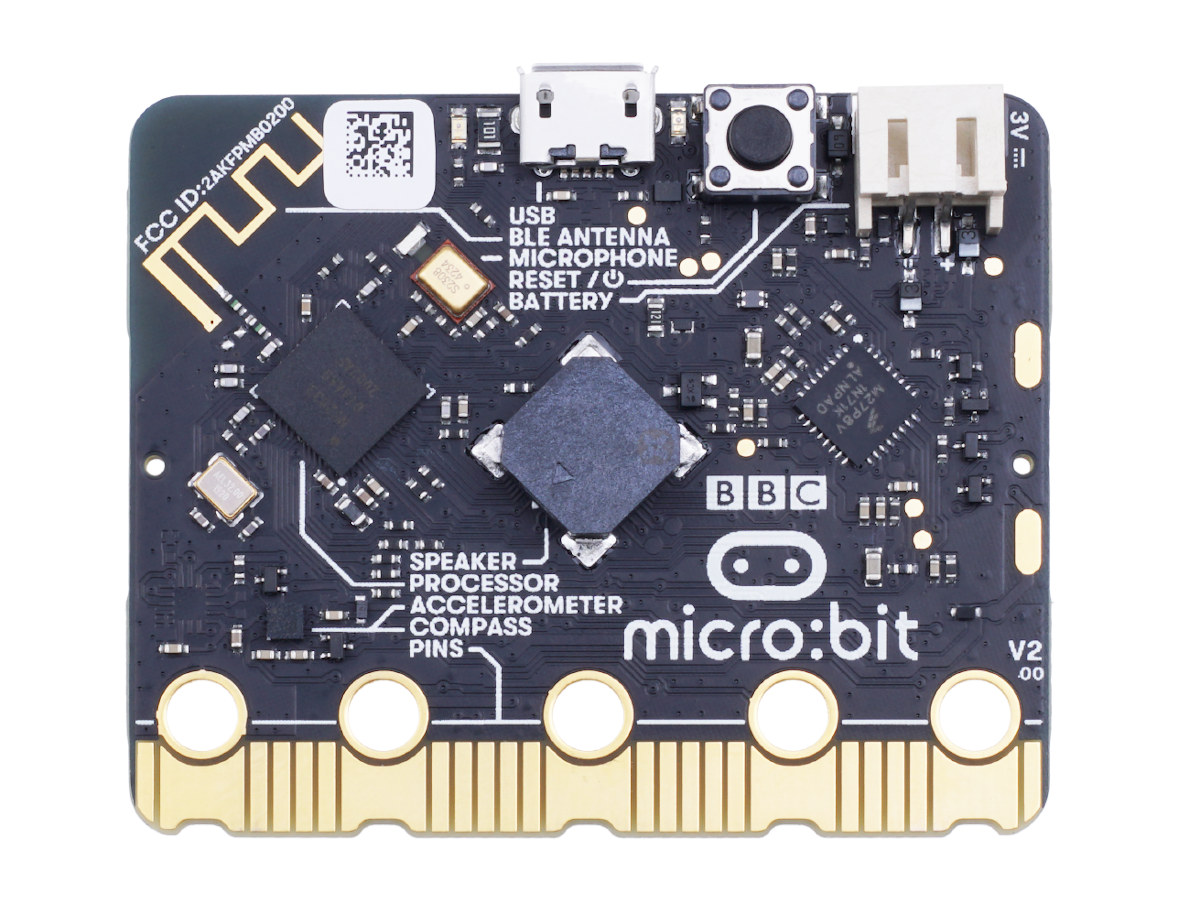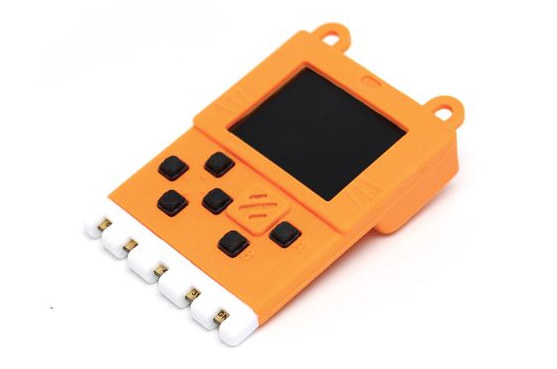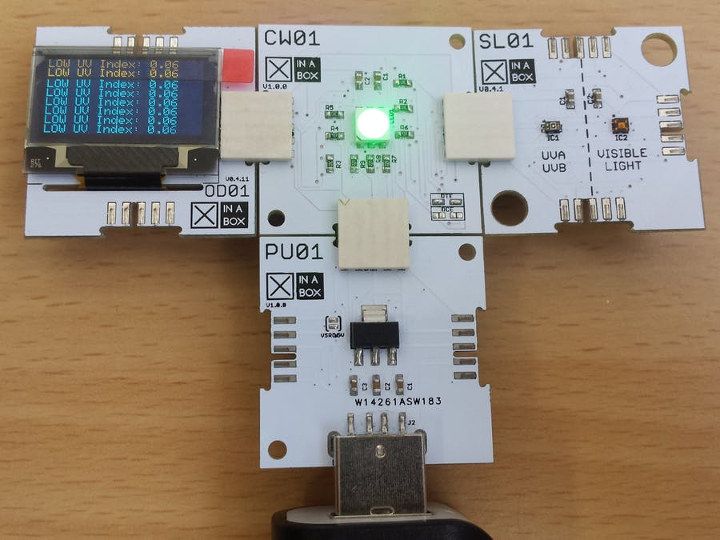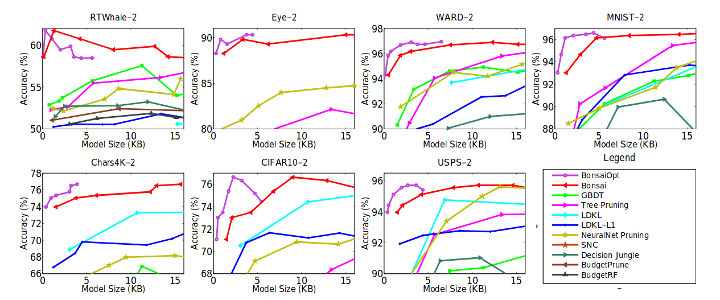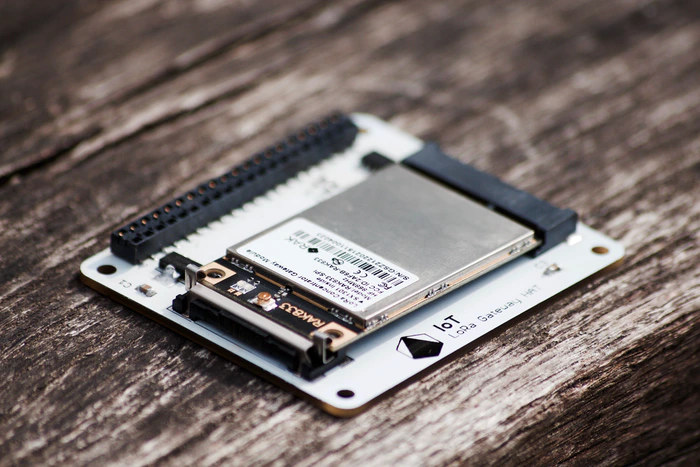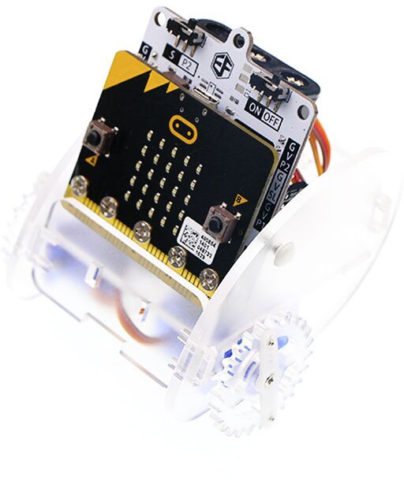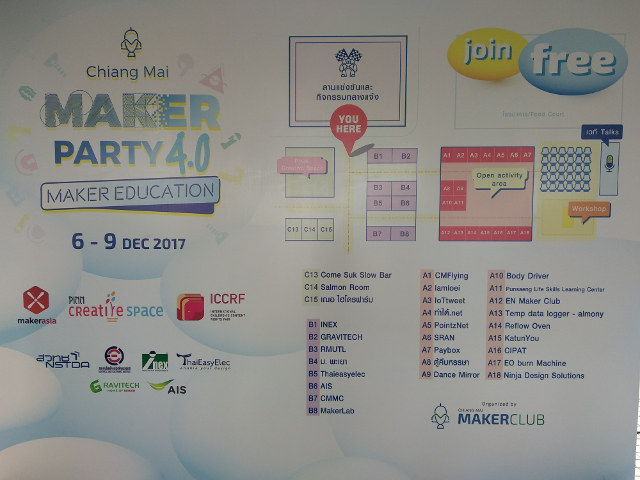In what should be one of the first RISC-V education platforms, the BBC, Tynker, and SiFive have just announced the BBC Doctor Who “HiFive Inventor” Coding Kit that comes with an MCU board with WiFi & Bluetooth and guided lessons for kids that teach them to code for the IoT. The HiFive Inventor board is based on a SiFive FE310 RISC-V microcontroller ( the same chip as found in the HiFive1 board) and an ESP32 Solo module for WiFi 4 and Bluetooth 4.x/5.x connectivity. Just like the BBC Micro:bit, HiFive Inventor provides a kids-friendly edge connector with I/O, an LED matrix, sensors, and more. The kit includes the HiFive Inventor hardware platform, a battery holder for three AA batteries (not included), the HiFive Speakers, an illuminated USB cable for power and programming, and alligator clips to connect the speaker or other add-ons to the HiFive Inventor board. HiFive Inventor board […]
BBC micro:bit v2 board Unveiled with Nordic nRF52833 SoC, Microphone and Speaker
The original BBC micro:bit educational board was launched in July 2015 with a Nordic nRF51822 Arm Cortex-M0 MCU @ 16 MHz providing Bluetooth LE connectivity, a few I/Os, some buttons, and a LED matrix acting as a small display. The British company has now launched a new update with BBC micro:bit v2 with the same form factor, but equipped with a more powerful Nordic Semi nRF52833 Bluetooth 5.1 Arm Cortex-M4 MCU clocked at 64 MHz and adding a microphone and a speaker. BBC micro:bit v2 specifications: Wireless MCU – Nordic Semi nRF52833 Arm Cortex-M4 MCU clocked at 64 MHz with 128 KB RAM, 512 KB flash, Bluetooth 5.1 LE connectivity “Display” – 25x red LED indicator lights in a 5×5 matrix USB – 1x micro USB port for power and programming via NXP Kinetis KL27Z Cortex-M0+ microcontroller Audio – Built-in MEMS microphone and speaker Expansion 25 pins on edge connector […]
Kittenbot Meowbit Retro Game Console Features BBC Micro:bit Edge Connector
At first glance, Kittenbot Meowbit gaming console looks like a kid’s toy, but it’s bit more than that as its STM32 MCU can be programmed with MakeCode arcade, Scratch3.0 based Kittenblock, or MicroPython, and features the same edge connector as found in BBC Micro:bit board, and as such is compatible with several Micro:bit accessories. Kittenbot Meowbit specifications: MCU – STMicro STM32F401RET6 Arm Cortex M4 micro-controller Storage 2MB SPI flash to store Unicode character table (default) SD card slot to store programs or extend wireless modules Display – 160 x 128 full-color TFT LCD Sensor – Light sensor, temperature sensor, MP6050 gyroscope USB – 1x micro USB port for power and programming Expansion – 40-pin BBC Micro:bit “goldfinger” connector Misc – Charging/work LED, 2x user LED, power switch, reset button, DFU mode button, 4x direction buttons, A/B buttons, buzzer, multiplayer connector (15) Power Supply – 5V via USB, or 3.7~4.2V via […]
XinaBox’s xChips Enable Modular Electronics for Makers & STEM Education
So today, I decided to have a look a 96Boards website to see if there was anything new from the community, and I came accross “X in a Box B901“, an “☒CHIP is designed to interface with the 96 Boards, such as the Dragonboard 410c. This provides an interface to support the ☒CHIP ecosystem, adding support for many additional sensors etc…” I had no idea what it was all about, so obviously I had to investigate. Xinabox (X in a Box) is an ecosystem of modular electronics boards used for developing, making products and learning. There are now over 70 modular xChip” with cores/CPUs, sensors, power, communication, output, and storage. They are interconnected together without wires, soldering, breadboards, and adapters are provided for Raspberry Pi, 96Boards, and other development boards. xChips can be sorted into 8 categories: Cores – MCU/CPI cores based on Microchip ATMega328P, SAMD21, ESP8266, or ESP32 with […]
Bonsai Algorithm Enables Machine Learning on Arduino with a 2KB RAM Footprint
Machine learning used to be executed in the cloud, then the inference part moved to the edge, and we’ve even seen micro-controllers able to do image recognition with GAP8 RISC-V micro-controller. But I’ve recently come across a white paper entitled “Resource-efficient Machine Learning in 2 KB RAM for the Internet of Things” that shows how it’s possible to perform such tasks with very little resources. Here’s the abstract: This paper develops a novel tree-based algorithm, called Bonsai, for efficient prediction on IoT devices – such as those based on the Arduino Uno board having an 8 bit ATmega328P microcontroller operating at 16 MHz with no native floating point support, 2 KB RAM and 32 KB read-only flash. Bonsai maintains prediction accuracy while minimizing model size and prediction costs by: (a) developing a tree model which learns a single, shallow, sparse tree with powerful nodes; (b) sparsely projecting all data into […]
Pi Supply IoT LoRa Boards are made for Raspberry Pi & BBC Micro:bit Boards (Crowdfunding)
We’ve already covered plenty of LoRa boards or solutions designed for nodes or gateways such as TTGO T-Beam ESP32 + LoRa board, RAK Wireless RAK811 GPS Lora tracker board, MatchX Matchbox LoRa gateway, and many others,, but Pi Supply offers yet more options with LoRa node and gateway add-on boards designed to work with Raspberry Pi, Arduino, and BBC Micro:bit boards. Pi Supply LoRa Gateway HAT for Raspberry Pi The IoT LoRa Gateway HAT is based on RAK Wireless RAK833 mPCIe LoRa gateway concentrator module and connects to Raspberry Pi 3 B/B+ board via the 40-pin header. There are two hardware version using 868 MHz or 915 MHz frequencies, but as we’ve seen in previous reviews those are configurable for other frequencies such as AS923 or IN865. Pi Supply IoT LoRa Node pHAT for Raspberry Pi LoRa Node pHAT is designed for node specifically, and with a smaller form factor […]
Ring:bit Car is a $20 Robot Kit for BBC Micro:bit
Elecfreaks has launched a robot kit designed for BBC Micro:bit that comprised of a chassis, and Ring:bit board with 3 channels of GPIO, among which 2 channels are used for driving servos. The kit can be used to teach children to control a mini car using Microsoft MakeCode visual programming editor. Ring:bit board specifications: Supports up to 3 servos with up to 2x external line detection modules when being shifted to P2. Misc – Power switch, function selection Power Supply 3x AAA batteries. Input Voltage – 3.9V-4.5V DC Dimension – 65.00 x 51.70 mm Weight – 27 grams The rest of the kit includes plastic parts for the chassis, two plastic gears, two servos, as well as screws for assembly. Documentation is somewhat limited, but you’ll find a user guide at the bottom of Ring:bit board product page, and the company points to a tutorial on Tinkercademy. As mentioned […]
A Day at Chiang Mai Maker Party 4.0
The Chiang Mai Maker Party 4.0 is now taking place until December 9, and I went there today, as I was especially interested in the scheduled NB-IoT talk and workshop to find out what was the status about LPWA in Thailand. But there are many other activities planned, and if you happen to be in Chiang Main in the next few days, you may want to check out the schedule on the event page or Facebook. I’m going to go though what I’ve done today to give you a better idea about the event, or even the maker movement in Thailand. Booth and activity area should be the same over the 4 days, but the talks, open activity, and workshop will be different each day. Today, people could learn how to solder in the activity area. The even was not really big with manufacturers/sellers like ThaiEasyElec, INEX, or Gravitech closer […]


